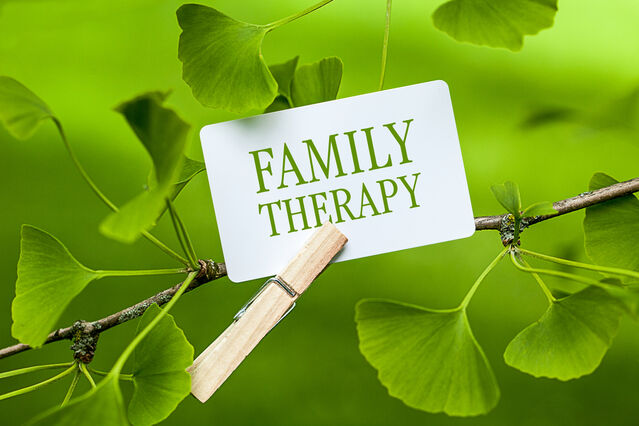Key points
- Family therapy can be a challenge when one party is particularly high in narcissism.
- Narcissists often have difficulty with accountability and empathy.
- There are things to consider before choosing family therapy with a narcissist.
- It is important to put your therapeutic needs first.

If you grew up with a parent who was high in narcissism, you may still be thinking you can fix or change the relationship in some way so you can get some of your emotional needs met. It’s certainly a normal desire. We all wish for a happy, well-connected, and loving family.
Think of narcissism as a spectrum disorder. At the low end are some narcissistic qualities that we all have; then, as one moves along the spectrum and the trait increases in severity, more problems typically ensue. The extreme end of that spectrum is a full-blown narcissistic personality disorder.
While some traits of narcissism are certainly annoying—but not necessarily abusive or harmful—other traits can be truly problematic. For example, if a narcissist is loud, flamboyant, boastful, and talks about themselves a lot, but doesn’t engage in other harmful behavior, you may be able to ignore or overlook these unpleasant traits.
The particularly harmful effects tend to include lack of empathy, lack of emotional tune-in to others’ feelings, lack of accountability, always needing to be right, having a sense of entitlement, exploitative behaviors that hurt others to benefit them, and showing envy rather than celebrating the people in their life. These destructive traits tend to be the ones that interfere with successful family therapy and could leave you feeling more frustrated, disappointed, full of angst, and sad.
Let’s look at some examples in the therapeutic setting:
1. Lack of empathy and inability to emotionally tune in to others’ feelings.
Imagine that you come to therapy with your narcissistic parent or family member, and the therapist asks you to reveal how you are feeling in this relationship. You begin to cry and express your sadness, anger, and hurt about how you have been treated.
The therapist is most likely hearing and responding to your pain. But the narcissistic party may just be sitting there with no emotion, waiting for you to be finished. They are not able to empathize or really tune into you. It’s like talking to a brick wall.
Usually, the therapist will urge the narcissist to practice empathy or even try to teach them how to do this. They may end up learning the right words to say—but if the true emotion is not there, it’s usually the case that others can feel it. We know when we have been seen and heard.
2. Lack of accountability and the need to be right.
Next, you may find that the highly narcissistic person often refuses to be held accountable for whatever you are describing and instead says you are wrong in your expression of feeling. They do not admit their actions but declare there must be something wrong with you. They have to be right—and of course, you are wrong.
During therapy with a person like this, you may get the impression that perhaps you are the crazy one and are just imagining these events or feelings, or perhaps you are just not a grateful son or daughter. Your perceptions of your reality are now questioned, and you begin to doubt yourself once again. They are right and you are wrong; end of story.
With someone high in narcissistic traits, there is often no accountability or actual care about what you are saying. During therapy, someone high in narcissism may even begin to question the therapist also, labeling them as “not good enough” in the process.
3. Entitlement.
Entitlement can get in the way of therapy because someone who is high in narcissism may seem to expect to be treated with automatic compliance with their expectations or wishes. They may feel that they are the important person in the room, and they expect special treatment. Their desire to avoid waiting, paying too much, or listening to others can interfere with therapy.
4. Exploitative of others for their own benefit.
Many people who are high in narcissism will attempt to exploit therapy time for their own benefit; and in the case of family therapy with an adult child, this may mean that they use it to tell the therapist what a bad son or daughter you have been or how you have caused them so much grief. The goal is to shift focus so they can appear as the victim or martyr who sacrificed so much for their “ungrateful child.” In some extreme cases, they may even leave messages for the therapist later sharing some of your very personal information to make sure the therapist is on their side.
5. Envy.
Envy is a killer of love. Many times, adult children of narcissists just want to share their accomplishments or recovery work with a parent in therapy. Because someone high in narcissism typically has a very fragile ego and has to be the best at everything, they are often threatened by their own children’s accomplishments or feel like the child must not outshine them.
Desperately wanting your parent to be proud of you and celebrate you can, in some cases, turn into that very parent finding things wrong to notch you down a few pegs, most likely so they don’t feel insecure. “Well, don’t get a big head over that; it’s unbecoming.” They may, alternatively, try to take credit for whatever the child has done. “Yes, that’s great, but you couldn’t have done it without me.”
Is Family Therapy a Good Choice?
Family therapy can be a wonderful solution to solving many dysfunctional family-of-origin issues. If the family members have some traits of narcissism but are not too far along the spectrum, there is certainly hope for recovery. Find a seasoned and licensed family therapist if your family can be accountable and provide empathy for each individual person in the family system.
However, if the above examples ring true for you before you even get to therapy, it may not be wise to take the family therapy route. Recovery for adult children of narcissists is, in many cases, an inside job. It is better to work your own recovery with your therapist and not try to fix or change the family. While we do not have the power to change others, we do have an incredible capacity for self-transformation.
Additional resources by the author can be found here.





